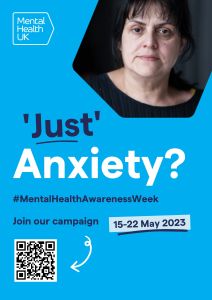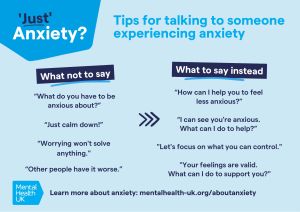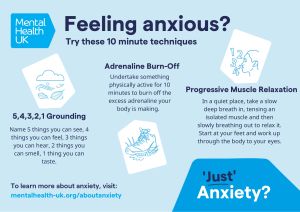 Mental Health Awareness Week is an important time for us to reflect on our mental wellbeing and the various factors that impact it. This year, the official theme set by the Mental Health Foundation is ‘anxiety’ or ‘Just Anxiety?’. Anxiety is a common emotion that we have all experienced, but when it becomes intense and frequent, it can turn into an anxiety disorder, which can significantly impact our quality of life.
Mental Health Awareness Week is an important time for us to reflect on our mental wellbeing and the various factors that impact it. This year, the official theme set by the Mental Health Foundation is ‘anxiety’ or ‘Just Anxiety?’. Anxiety is a common emotion that we have all experienced, but when it becomes intense and frequent, it can turn into an anxiety disorder, which can significantly impact our quality of life.
In the UK, over 8 million people are affected by anxiety disorders, and there are various types, including obsessive-compulsive disorder (OCD), post-traumatic stress disorder (PTSD), generalised anxiety disorder (GAD), phobias, and separation anxiety. It’s essential to understand the differences between these types of anxiety and have open and honest conversations about them.
Services providing counselling and cognitive-behavioural therapy (CBT) through the NHS are overwhelmed, leading to a lack of access to these effective treatments. Many people with anxiety disorders are prescribed anti-anxiety or antidepressants as a first-line treatment due to the long waiting times for talk therapies. This is why it’s crucial to know practical steps that we can take to better manage our mental health.
The first step is to be comfortable with thinking about and talking about our inner experiences. Everyone experiences anxiety and periods of feeling down. Instead of fighting these negative feelings, we should take a moment to see what they are trying to bring to our attention. Often, we’ll notice that we’ve let a particular situation get out of hand, or pressure has built up, and there are concrete steps that we can take to feel better.
down. Instead of fighting these negative feelings, we should take a moment to see what they are trying to bring to our attention. Often, we’ll notice that we’ve let a particular situation get out of hand, or pressure has built up, and there are concrete steps that we can take to feel better.
Making a pact with ourselves to engage in self-care is essential. Self-care isn’t all about Instagrammable bubble baths and ‘me time’. It’s about taking care of ourselves by maintaining social support, talking to other people to get different points of view, eating well, getting enough sleep and exercise, doing life admin tasks that we’ve been putting off, and letting go of the stress of them hanging over our head. When we give ourselves time and attention, we improve our resilience and stress management.
However, sometimes we can be doing all the ‘right’ things and still feel like we’re struggling with our mental health. Talking therapies have been proven to help treat anxieties, stress, and depression. Finding a therapist who we connect with is crucial. A good fit is someone with whom we feel comfortable and trust and who is knowledgeable about the evidence-based treatment of anxiety disorders.
One type of therapy that can be particularly helpful is hypnotherapy. A qualified clinical hypnotherapist can assist individuals in learning to better understand anxiety and change their relationship to their anxious thoughts and feelings. Hypnotherapy can help people become more confident and at ease with things that have previously been challenging for them.
 While the content of sessions vary depending on the style of the hypnotherapist, usually the therapist guides the client into a deeply relaxed state, allowing them to become more receptive to suggestion and explore their subconscious mind. This can help identify the root causes of anxiety, reframe negative thought patterns, and develop positive coping mechanisms.
While the content of sessions vary depending on the style of the hypnotherapist, usually the therapist guides the client into a deeply relaxed state, allowing them to become more receptive to suggestion and explore their subconscious mind. This can help identify the root causes of anxiety, reframe negative thought patterns, and develop positive coping mechanisms.
By seeking professional support, you can learn to manage your anxiety more effectively, and gain a greater sense of control over your thoughts and emotions. It’s important to remember that anxiety is a treatable condition, and that you don’t have to suffer alone. With the right support, you can learn to live a fulfilling and enjoyable life, free from the limitations of anxiety. So, take the first step towards better mental health today, and reach out for the help and support you need.
Click here to access the NCH directory, with over 3,000 therapists all around the UK there’s sure to be someone to help close to you.












